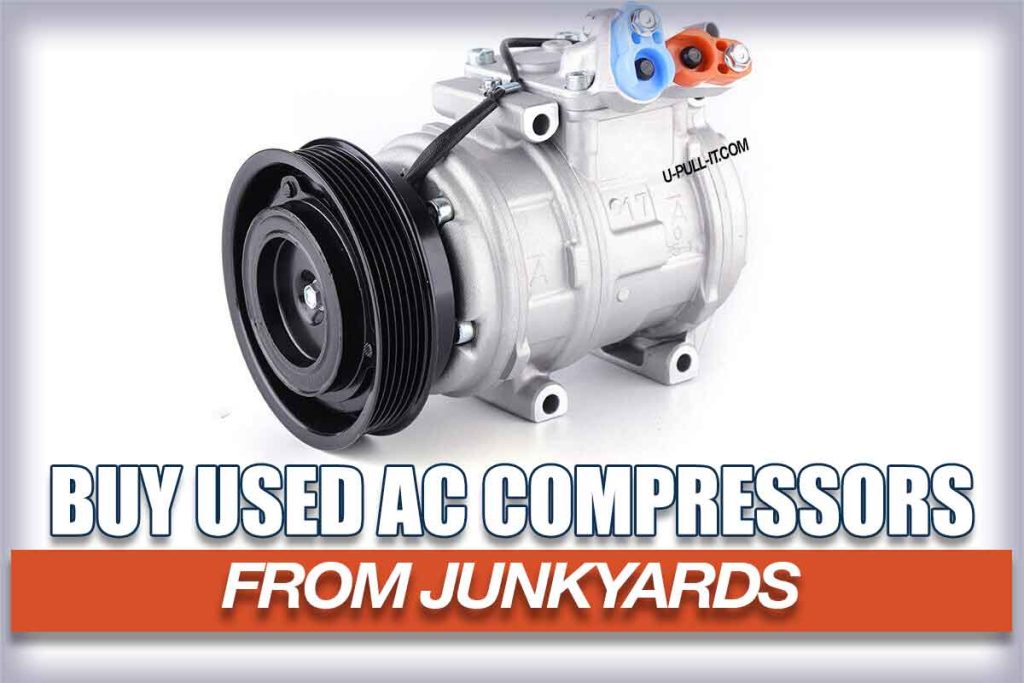Venturing into the realm of used auto parts, like engines, can be a savvy move for car enthusiasts and budget-conscious drivers alike. A junkyard AC compressor offers an economical solution to replace a faulty unit without breaking the bank. With reliability and cost-effectiveness in mind, this post delves into why choosing a reclaimed AC compressor from a junkyard could be your best bet, ensuring you stay cool on the road while keeping your finances in check.
Navigating through scrap heaps might seem daunting, but with the right approach, it’s like uncovering hidden treasures worth a fortune. We’ll guide you through selecting the best possible junkyard AC compressor, guaranteeing that quality isn’t compromised by affordability.
Understanding Junkyard AC Compressors
Benefits
Buying an AC compressor from a junkyard can save you money. New units are expensive. A junkyard part costs less. You might find original equipment manufacturer (OEM) parts there too. These are good because they’re made for your car model.
Reusing parts helps the planet. It means less waste and fewer new parts need making.
- Cost savings
- Potential OEM finds
- Eco-friendly choice
Risks
Not all junkyard compressors work well, though. Some may be broken or wear out fast. This is a risk when buying used items.
There’s often no warranty on junkyard parts either. If it fails, you lose money and time. The past life of these compressors is unknown as well, which adds to the uncertainty.
- Possible faulty units
- No guarantees provided
- Mysterious history
Viability
Consider how long a compressor will last against its price before buying one from a junkyard. Some car models have more compressors available than others do at these places. Think about if you can refurbish the part too, which could extend its life.
- Life versus cost assessment
- Model availability check
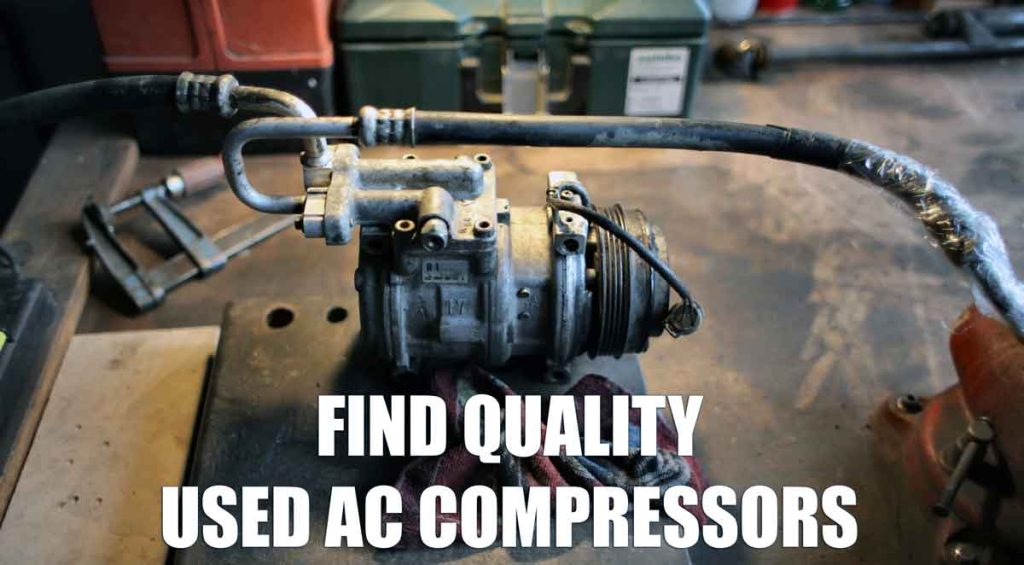
Identifying Quality Used AC Compressors
Visual Inspection
Before buying a junkyard ac compressor, always conduct a thorough visual check. Look for any signs of physical damage or rust that could affect performance. A damaged unit may lead to future problems.
Check the hoses and connections too. They should be free from excessive wear. This is crucial for ensuring a good fit and avoiding leaks.
Look closely at the seals for oil stains. Oil leakage suggests seal failure, which can cause compressor malfunction.
Performance Testing
Testing how well the compressor works is key. You want one that cools effectively and responds well to controls.
First, confirm it operates as expected. It should turn on and off without delays or strange noises.
Next, make sure it provides enough cooling power. If it doesn’t cool properly, it’s not worth buying.
Lastly, listen to its cycling sound during operation. Irregular sounds indicate internal issues.
Compatibility Check
A correct match with your vehicle ensures proper function and installation ease.
Start by confirming the used compressor fits your car’s make and model exactly.
Then compare part numbers with your current system’s components for an exact match.
Finally, check that fittings align correctly with existing mounts in your vehicle.
Signs Your Vehicle Needs an AC Compressor Replacement
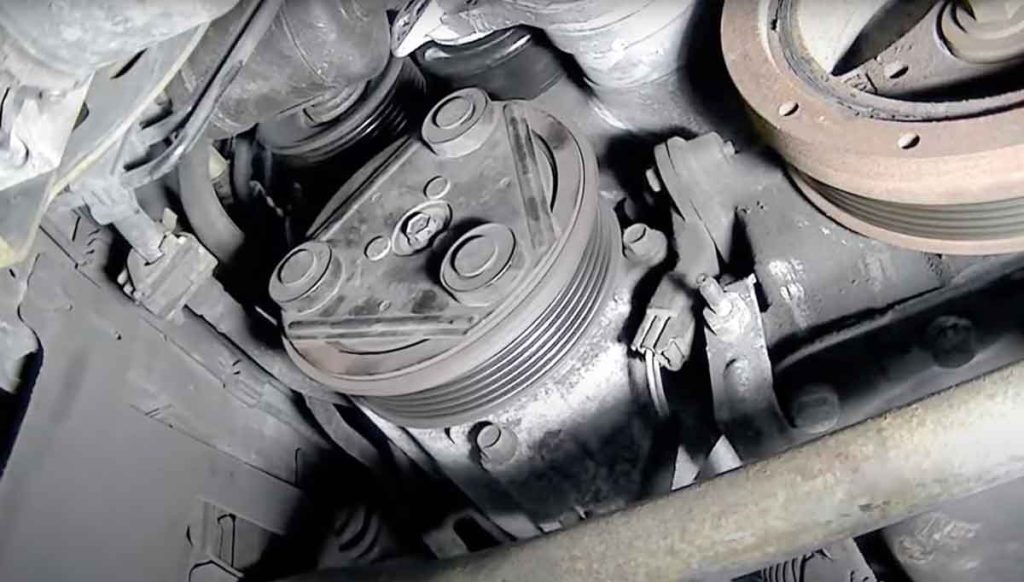
Strange Noises
When your car’s AC is on, listen closely. A healthy system is quiet. If you hear grinding or squealing, the compressor might be failing. These sounds suggest internal parts are wearing out.
Another bad sign is irregular clicking from under the hood when the AC starts. This could mean the compressor has trouble turning on. A humming noise might point to electrical issues within the unit.
Weak Airflow
A good airflow keeps your car cool. If air coming through vents feels weak, check a few things. First, see if the blower motor works right with your compressor.
Next, look for blockages in air ducts or filters that reduce flow. Also, test fan speed settings to make sure they respond well and adjust properly.
System Leaks
Leaks can drain refrigerant fast and harm your compressor. To spot leaks:
- Use UV dye or electronic detectors.
- Check all connection points and hose fittings.
- Look for oily spots as these often show where leaks are happening.
Catching leaks early helps avoid bigger problems with your AC system later on.
Inoperative Clutch
The clutch lets your compressor turn on and off while driving. To test it:
- Try giving direct power to see if it engages.
- Inspect electrical connections for damage.
- Watch the clutch plate move when powered up; it should move smoothly without sticking or hesitating.
If any of these signs appear after checking a used AC compressor from a junkyard, consider getting a replacement to ensure comfort during drives in hot weather.
How to Test a Junkyard AC Compressor
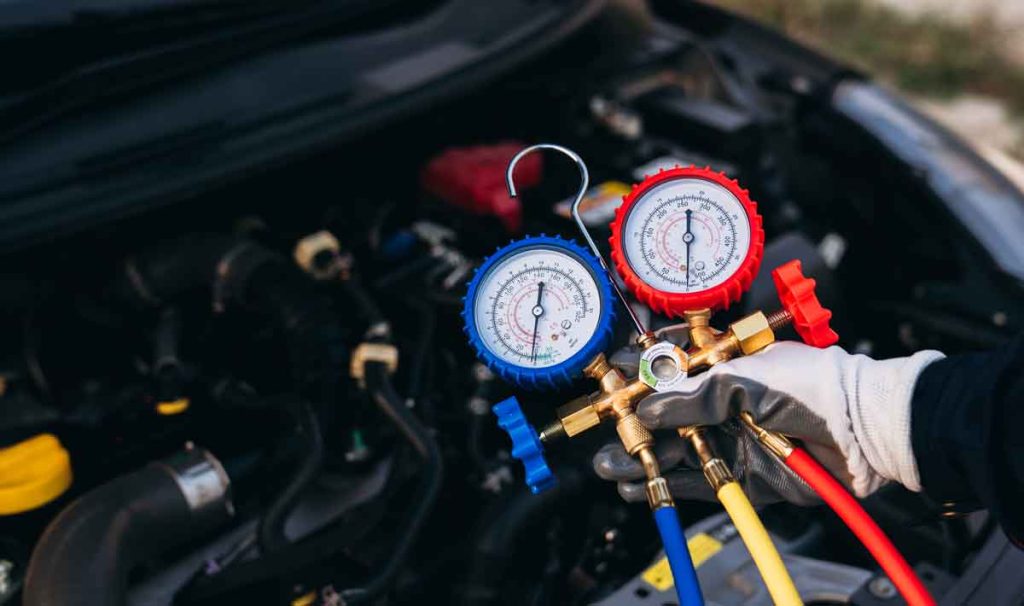
Pressure Gauges
Testing a junkyard AC compressor starts with pressure gauges. These tools measure pressure levels on both high and low sides of the system. You must compare these readings to the manufacturer’s specifications. Correct pressure indicates a healthy compressor.
If gauge readings fluctuate, this could signal problems. Consistent pressures close to specified values suggest good function. Remember, abnormal pressures often point towards issues within the system.
Leak Detection
Next is checking for leaks using specialized tools called sniffer devices. They detect refrigerant escaping from tiny openings you can’t see. This step ensures no harmful gases leak into your car or the environment.
Another method involves soapy water applied to connections and joints. If bubbles form, there’s likely a leak present. Also, keep an eye on your gauges; if pressures drop over time without adding more refrigerant, it means there’s a leak somewhere in the system.
Clutch Engagement
Lastly, observe how well the clutch engages when you turn on the AC unit in your vehicle. A properly functioning clutch will make an audible click sound which signifies engagement is happening as expected.
Listening for this click helps diagnose electrical faults related to clutch operation too—no click might mean relay issues or insufficient voltage supply to the coil that manages clutch engagement.
To ensure accuracy in testing these compressors from junkyards near me, follow these steps carefully and always refer back to manufacturer guidelines for precise information about proper operational standards.
Sourcing a Reliable Used AC Compressor Online
Reputable Sellers
Finding a reputable seller is key when buying a used AC compressor. Start by checking the seller’s history. Look for how long they have been in business. A long-standing presence often means reliability. Next, check if the seller has any business licenses or certifications. These show they meet certain standards.
Ask trusted mechanics for recommendations too. They know where to find quality parts. You can also visit forums dedicated to auto repairs and ask about reliable sellers there.
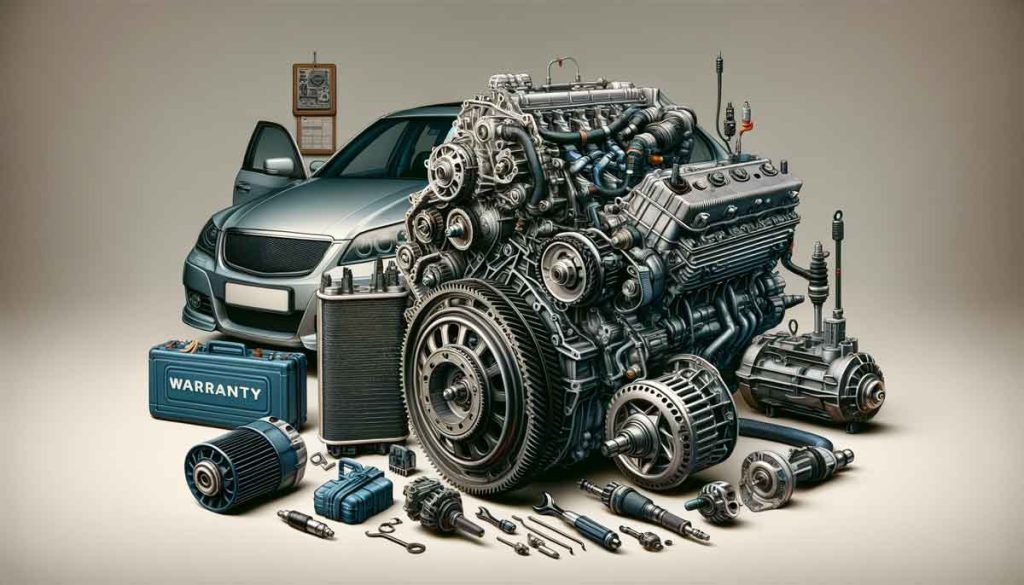
Warranty Offers
A warranty can protect your purchase of a junkyard ac compressor. Always ask sellers if they offer warranties or guarantees on their products. Make sure you understand what the warranty covers and its terms and conditions.
Pay attention to expiration dates and coverage limits as well. Some warranties may only last for short periods after purchase, while others might cover more issues but expire sooner.
Customer Reviews
Customer reviews are invaluable when sourcing an ac compressor online from a junkyard source:
- Read feedback on seller profiles.
- Check auto part forums for opinions.
- Look at both positive and negative comments carefully.
Seeing what other buyers have experienced will help you decide who to trust with your money.
Preparing for Installation
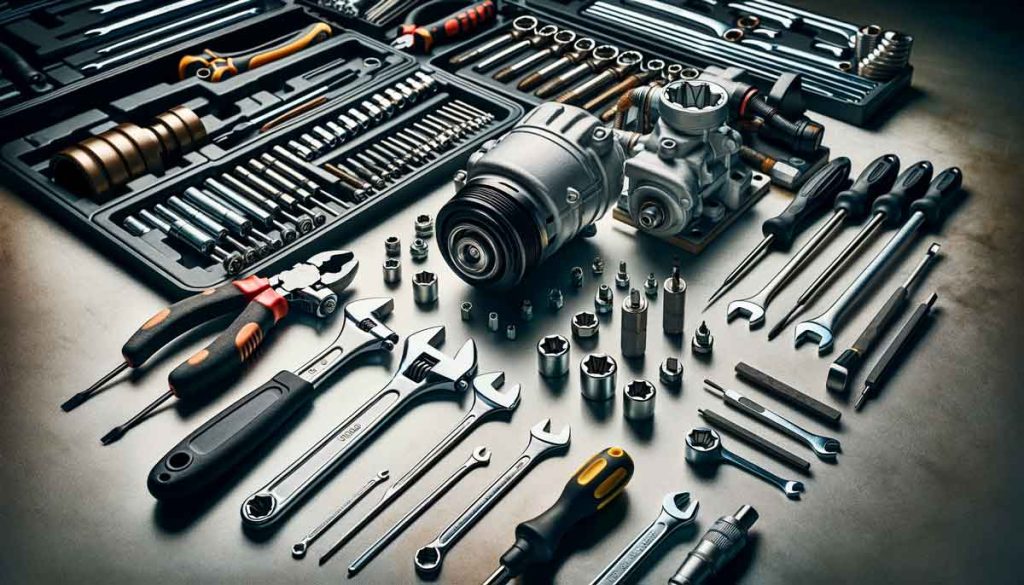
Required Tools
Before installing a junkyard AC compressor, gather the right tools. You’ll need an AC manifold gauge set and a vacuum pump. These specialized tools are crucial for the job.
Make sure you have basic hand tools too. Check your toolbox for:
- Wrenches
- Screwdrivers
- Pliers
It’s important to confirm these items before starting. You don’t want to pause mid-installation to find missing equipment.
Safety gear is also key. Ensure you have:
- Gloves
- Goggles
These will protect you during the installation process.
Safety Precautions
Always put safety first when working on your car’s AC system. The first step is simple but vital: disconnect the battery. This prevents electrical accidents while you work.
Next, suit up in protective gear like gloves and goggles. They shield you from refrigerant, which can be harmful if it contacts skin or eyes.
Finally, keep your work area well-aired out when using chemicals during installation.
By following these guidelines, installing a used AC compressor becomes safer and more efficient. Remember that proper preparation leads to successful outcomes in automotive repairs.
Step-by-Step Installation Guide
Removal Process
To start, document each step of the disassembly. This will be your guide when you reinstall the compressor. Make sure to keep track of all parts removed.
Next, carefully detach the refrigerant lines and electrical connectors from the old compressor. Handle them gently to avoid damage.
Support the compressor securely as you remove it. This prevents other parts from getting strained or damaged.
Fitting the Compressor
Install your junkyard AC compressor by following these steps closely. First, bolt it in place using appropriate torque settings per manufacturer specs.
Always replace O-rings on fittings with new ones. Lubricate them with proper refrigerant oil before installation for a good seal.
Make sure belt pulleys are aligned accurately. It’s crucial for smooth operation.
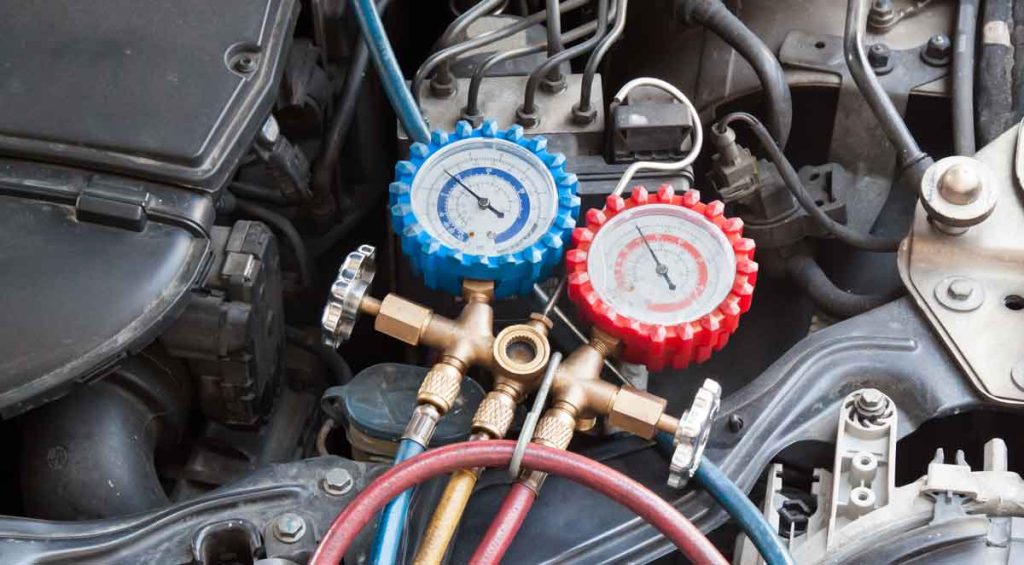
System Recharge
Before adding new refrigerant, evacuate the system thoroughly to remove any air and moisture.
Then charge it with correct type and amount of refrigerant based on vehicle requirements.
Afterward, monitor system pressure to confirm there are no leaks in your work.
By following this guide closely, you can ensure a successful installation of a junkyard AC compressor into your vehicle. Remember that attention to detail is key throughout this process.
Maintenance Tips for Used AC Compressors
Regular Checks
After installing a junkyard ac compressor, it’s vital to keep it in good shape. Schedule inspections often. This helps you find issues before they get big. Watch how your AC works as time goes on. If things change, it might be a sign of trouble.
Use pressure gauges to check refrigerant levels now and then. Low levels can mean leaks or other problems. Catching these early keeps your AC running smoothly.
Cleanliness
Keeping the area around your AC clean is key to its health. Dirt can clog up the system and cause damage over time. Make sure you clean the condenser fins often too; this will help with heat going away from the unit.
Also, don’t forget about air filters! Change them regularly so that everyone breathes easier and your system doesn’t work harder than it should.
Professional Servicing
Sometimes, fixing an AC isn’t something you should do alone—especially if you got yours from a junkyard and installed it yourself following our previous guide on installation steps.
If you’re not sure about something or if there’s a tricky problem, get help from someone who knows what they’re doing—a certified technician is best for this job. They have tools and knowledge that go beyond just looking at things—they can figure out exactly what’s wrong when visual checks don’t tell you enough.
And if there are ongoing issues even after trying fixes, definitely talk to an expert for advice on what to do next.
Final Remarks
Navigating the world of used AC compressors need not be daunting. Armed with knowledge on identifying quality units, testing procedures, and installation tips, you’re equipped to make an informed decision. Remember, a well-chosen junkyard compressor can breathe new life into your vehicle’s AC system without breaking the bank. Maintenance is key; regular checks ensure longevity and peak performance.
Don’t let a faulty AC compressor leave you sweating. Take action now. Seek out a reputable salvage yard or online vendor, secure a reliable used compressor, and enjoy cool comfort on the road. Your savvy investment not only saves money but also supports recycling efforts—a win for both your wallet and the planet. Ready to revitalize your ride? Start your search today.
Frequently Asked Questions
How can I tell if a junkyard AC compressor is of good quality?
Inspect for physical damage, check for smooth pulley rotation, and ensure the clutch engages properly. Prefer compressors from low-mileage vehicles.
What are the signs that my vehicle’s AC compressor needs replacing?
Loud noises when the AC is on, inability to cool the car, or visible signs of damage to the compressor indicate replacement is needed.
Can I test an AC compressor while at the junkyard?
Yes, ask to perform a bench test or request assistance. Check for proper engagement and listen for irregular sounds.
Is it safe to buy a used AC compressor online?
Yes, if you purchase from reputable sellers with clear return policies and warranties. Check reviews and ratings beforehand.
What should I do before installing a used AC Compressor?
Clean all connecting parts thoroughly and replace o-rings or seals as necessary. Ensure compatibility with your vehicle’s system.
Do you have any installation tips for a used AC compressor in my car?
Follow manufacturer guidelines strictly; use proper tools; replace drier/filter; evacuate and recharge the system professionally after installation.
What maintenance does a used AC compressor require post-installation?
Regularly check refrigerant levels, inspect belts and hoses for wear, and listen for unusual noises during operation.
